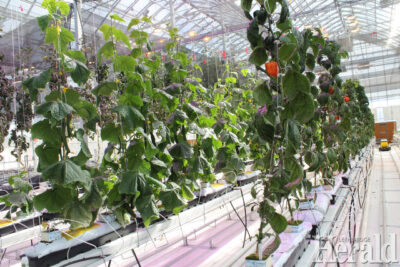Lethbridge College receives greenhouse research grant
By Justin Sibbet - Lethbridge Herald Local Journalism Initiative Reporter on April 28, 2023.
 Herald photo by Justin Sibbet
Pepper and cucumber plants grow at the greenhouse at Lethbridge College.
Herald photo by Justin Sibbet
Pepper and cucumber plants grow at the greenhouse at Lethbridge College.Lethbridge College has received a grant of over $350,000 to begin research on a three-year initiative to discover high-efficiency greenhouse lighting.
The money comes from the Agriculture Funding Consortium, a group that has funded 38 other research projects across Canada with over $11 million spent.
Megan Shapka, director of applied research operations at the Centre for Applied Research, Innovation and Entrepreneurship at Lethbridge College, says the funds will be spent primarily on hiring researchers.
“Most of the money actually goes toward people. So it’s to pay for the researchers and bring in other technical staff that we need to actually run the project,” said Shapka.
She says there will be money used for materials and supplies as well, but the majority is already available at the greenhouse.
“The infrastructure is already here, we already have all of the lights,” said Shapka.
She says the greenhouse industry in Alberta is still its infancy, so this research will help industry professionals better understand growing techniques in this environment.
“The high-tech commercial vegetable and fruit production industry is quite new,” said Shapka.
She says traditional greenhouses do not have artificial lighting, so they rely on sunlight year-round.
“In Alberta, especially in the winter, that’s hard, it’s dark at five,” said Shapka.
As a result, she says the new program should enable growers in the province to operate more successfully in every month of the year.
“The point of the project is to explore different types of supplemental light and find the most energy efficient lights and also find the lights that improve your crop,” said Shapka.
Furthermore, she says the greenhouse is outfitted with several other technologies that will allow researchers to understand plant growth beyond the lighting effects.
“We can see what is going on with the plants before symptoms start showing up,” said Shapka.
Although this greenhouse is operated by the college, few students will be involved in the new lighting research.
Shapka says some students will be hired as assistants, but the bulk of the work will be done from professional researchers.
“Our facility is really focused on industry-driven projects, so we’ve got commercial partners in all of our projects,” said Shapka.
She says the greenhouse was fully completed in 2021 and is designed almost exclusively to research new technologies or practices.
“Mostly this is industry-focused because we’re testing different technologies, we’re validating practices so these commercial greenhouse growers can apply the learnings,” said Shapka.
As well, Shapka says the greenhouse is designed just like a standard industry facility, which will ensure an easy transition of research to real-world use.
“That’s exactly why we built it, it very much mimics a commercial greenhouse. It’s smaller in scale but that’s the point of research. You do it at a small scale and then you scale it up to the commercial operation,” said Shapka.
However, she says the smaller greenhouse is still more than capable of producing a significant yield.
“When we did peak harvest last year, when this was full, I think they did 3,000 cucumbers that week,” said Shapka.
She says the industry is becoming larger in the province, so the college was eager to help.
“There seems to be a lot of interest and excitement for the potential of the greenhouse industry in Alberta and we’re happy to support that,” said Shapka.
She also says the college greenhouse can be defined as a living ecosystem and no pesticides or chemicals are used.
Once the yield is ready to be picked, the college donates the crops to a variety of locations around Lethbridge.
Shapka says the Lethbridge College students’ food bank, Lethbridge Food Bank and the college culinary program all receive the donations.
With the hot temperatures of summer fast approaching, the college will wait and begin work in the fall, focusing on peppers, tomatoes and cucumbers.
30-29




